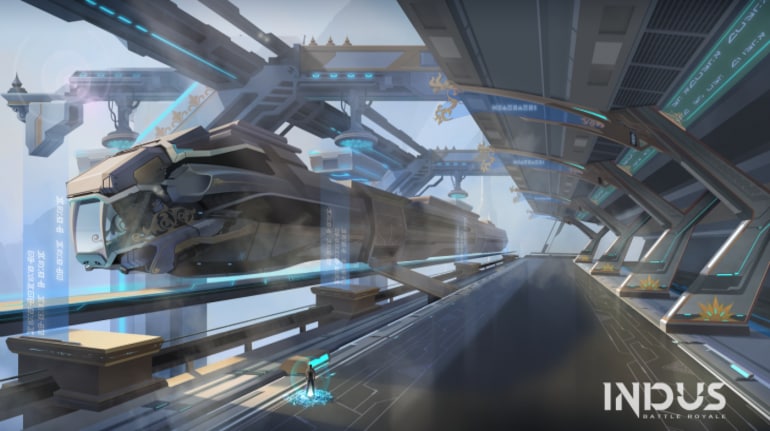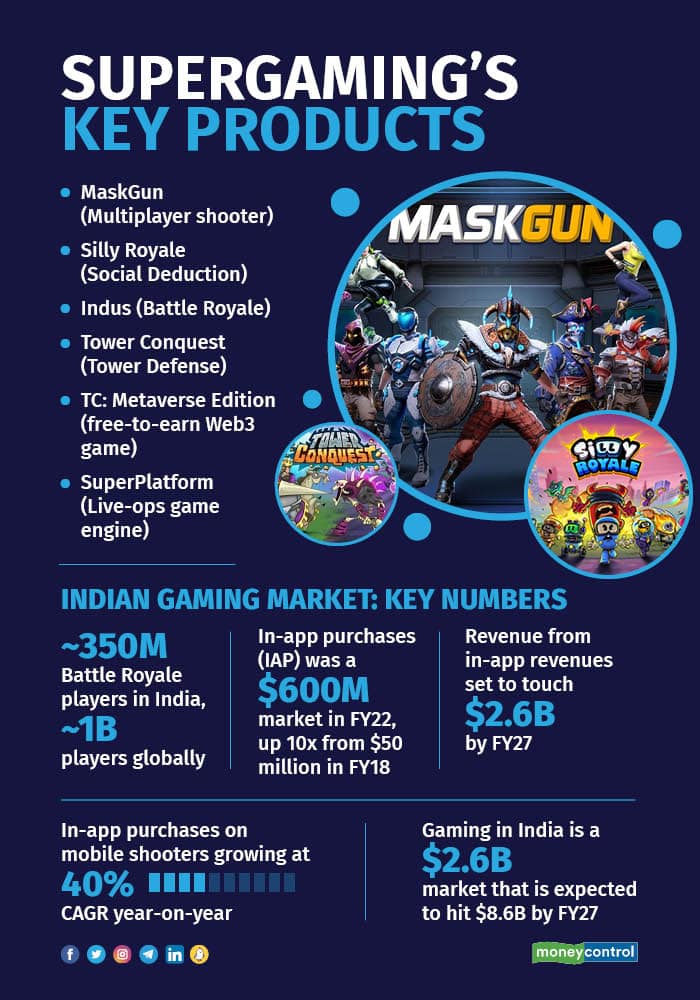



With India’s gaming market reaching an inflection point in terms of scale and the propensity to pay, startups are increasingly basing their video games on Indian stories and themes for wider adoption by players.
SuperGaming, a Pune-based game development studio, is one such startup that is developing a made-in-India title called Indus, which belongs to the popular battle royale shooter genre in which online players fight to the death until only one remains. The genre is currently dominated by titles such as Battlegrounds Mobile India (BGMI), Free Fire, Fortnite, Call of Duty, and Apex Legends.
The game, which is heavily inspired by Indian culture and mythology, features the Indus Valley civilisation as the backdrop of the story and is set in ‘Indo-Futurism,’ which the company describes as a futuristic world that is “unapologetically Indian in its exploration and representation of science fiction.”
This is the most ambitious title for the startup, which previously developed games such as the multiplayer shooter title MaskGun, which claims to have clocked over 65 million players since its inception, and social deduction title Silly Royale, which claims to have registered over 20 million players.
“We’ve set ourselves a very ambitious target of building the first AAA title out of India for the world on mobile, console and PC,” SuperGaming cofounder Roby John told Moneycontrol. AAA games are those that typically have large budgets for both development and marketing purposes.
“Indus is a highly technical project. I will say making a MaskGun or a Silly Royale has been the education that is needed to build an Indus. You cannot get a master’s degree till you have gone to high school or done your bachelor’s degree,” he said.
About “tens of millions of dollars” go into the making of a game like Indus over two-five years, John said. SuperGaming currently counts Akatsuki Entertainment Technology Fund, Skycatcher, BAce Capital and Dream Incubator among its investors.
While ambitions for Indus are global, India is an important part of the company's strategy due to the rising popularity of the battle royale genre in the country, which has over 350 million players in the country, as per industry estimates.
Moneycontrol had earlier reported that the gaming habits of consumers in India are maturing and they are moving beyond casual games to those that offer deeper experiences or provide them a way to socialise with their friends and family. This also resulted in people spending more money on mobile games in the country.
India had 120 million paying users in FY22, with two million new paid users added every month, according to a report by gaming and interactive media venture fund Lumikai. It also mentioned that the average revenue per paying user grew 11 percent to $20 per year in FY22.
Mid-core games, which include battle royale games, were the fastest-growing category in FY22 and generated combined revenues of about $550 million in the country, the report said.

Community focus
SuperGaming started testing a pre-Alpha version of the Indus game with a community of players, content creators, and e-sports professionals earlier this year, after more than two years of development. It has already held two community playtests, one in its Pune studio with 25 players in August 2022 and the other in Bengaluru with 250 players in November 2022, with plans to hold more at regular intervals.
These playtests, according to John, are critical for gathering feedback on various aspects of the game and then implementing some of them, either through new features or tweaking existing ones, to improve the overall experience. The playtests also help to validate some of the major changes they attempt with the game.
“We can’t build a better game without knowing who we’re building it for and what they want,” John said.
SuperGaming added gyroscope support as well as features like fist combats (Melee Attack), a smart inventory management system, custom control system, and auto loot pickups to the latest version of the Indus game, after getting feedback from the first playtest.
John said community-led initiatives have always been a big part of their approach to game development, starting with MaskGun, which has also helped them with marketing and distribution of their titles across the world. He noted that MaskGun already had about 5 million people playing the game before its official global launch in mid-2019. People who are part of the community playtests are also mentioned in the end-credits of the game.
Beyond mobile
The launch will also help SuperGaming move beyond mobile gaming to platforms such as PCs and consoles, which will likely be critical as the startup eyes a robust global presence.
“I feel this is a natural progression for a studio like ours,” John said. “We have tested all our prior games on PC also, but we never released it since we were not sure of the potential of it. (With Indus), we see the potential of a PC and console version. We believe that building on PC and console platforms is a $100 million market for us, apart from the mobile platform that is $100 million a year. That's the kind of opportunity we are seeing here.”
Although it is still early days in terms of monetisation for Indus, in-app purchases will be the primary method how the company will make money from the title. As per industry estimates, IAP on mobile shooters is growing at a 40 percent CAGR year-on-year.
According to the Lumikai report, in-app purchases are expected to drive the future revenue growth in the country's gaming industry led by mid-core games. Revenue from in-app purchases touched $0.6 billion in FY22, registering more than 10x growth from approximately $50 million in FY18. The segment is expected to further grow at 34 percent CAGR for the next five years to reach an estimated $2.6 billion by FY27, the report said.
Indus runs on Unity as a base engine and uses its own custom game engine called SuperPlatform (previously Indus Engine). In November, SuperGaming partnered with Google Cloud to offer SuperPlatform to developers worldwide, allowing them to create better games.
The platform, which currently powers all of SuperGaming's efforts, will be available to game developers on a software-as-a-service (SaaS) model and will act as an independent software vendor on Google Cloud.
The opportunity
Despite the country’s size and the growing base of mobile gamers, India has had a limited representation in video games so far. John said they hope to change this with Indus and showcase Indian culture across the world.
Within the game, Indus hopes to surface those parts of Indian culture that may not be well known, but “deserve recognition — locally and internationally,” the company said, through the positive lens of ‘Indo-Futurism.’
Read: MPL's Mayhem Studios unveils its first gaming title Underworld Gang Wars
John said a key inspiration for the game’s Indo-Futurism setting was the Marvel Studios superhero film Black Panther’s take on Afro-Futurism and its interpretation of Wakanda, a fictional country that is depicted as the most technologically advanced nation in the world, a tale that found takers across the globe including the US and China.
The goal with Indo-Futurism is to “create a sci-fi universe that represents India and its ideas while being inclusive,” the startup said.
Games based on Indian stories and mythology also pave the way for increased localisation of mobile games and better monetisation.
About 80 percent of the gamers in a pan-India survey showed a propensity and preference for culturally resonant gaming content, while 69 percent claimed they would play an Indian IP-based game, as per the report by Lumikai.

Discover the latest Business News, Sensex, and Nifty updates. Obtain Personal Finance insights, tax queries, and expert opinions on Moneycontrol or download the Moneycontrol App to stay updated!
Find the best of Al News in one place, specially curated for you every weekend.
Stay on top of the latest tech trends and biggest startup news.